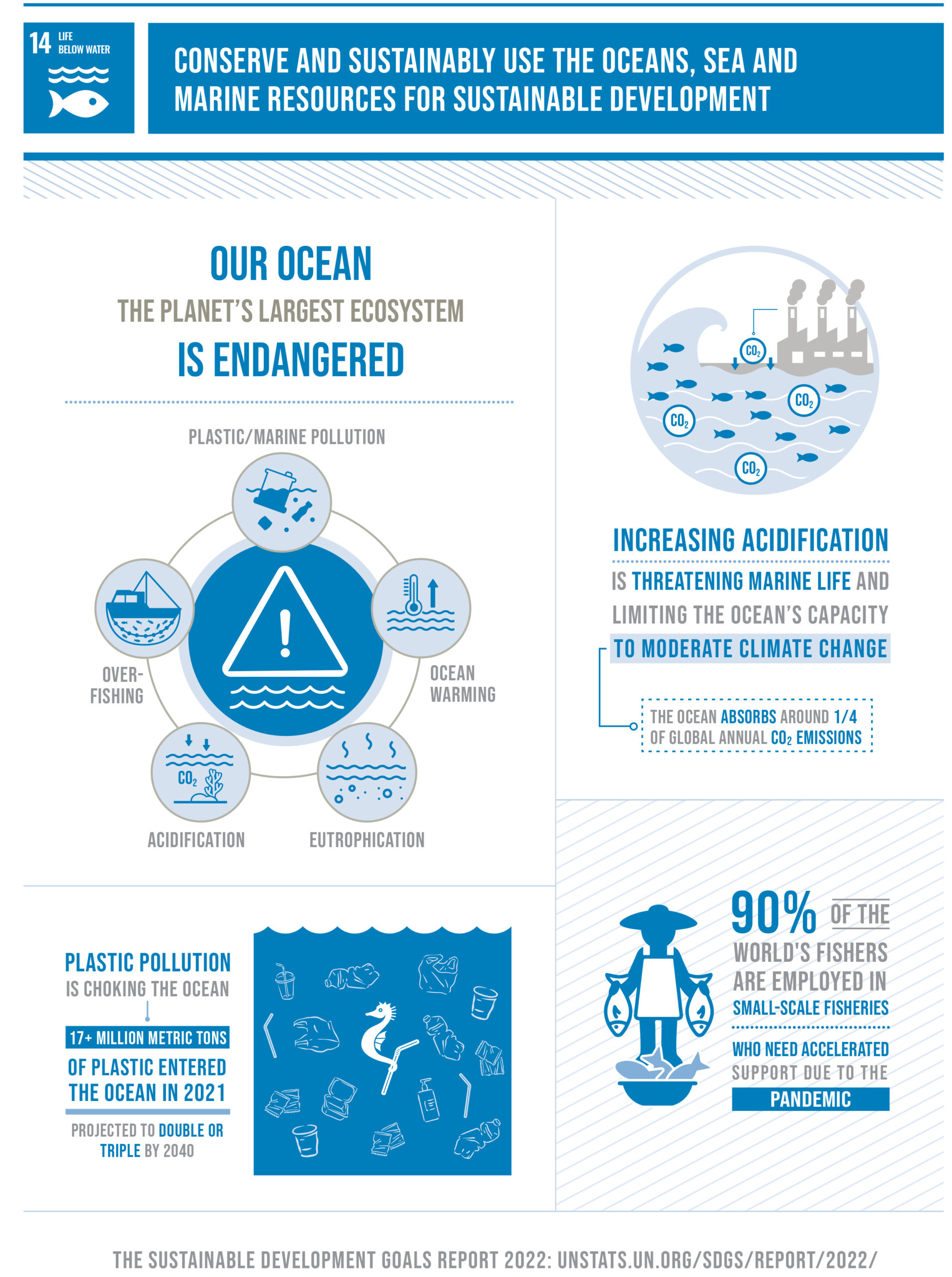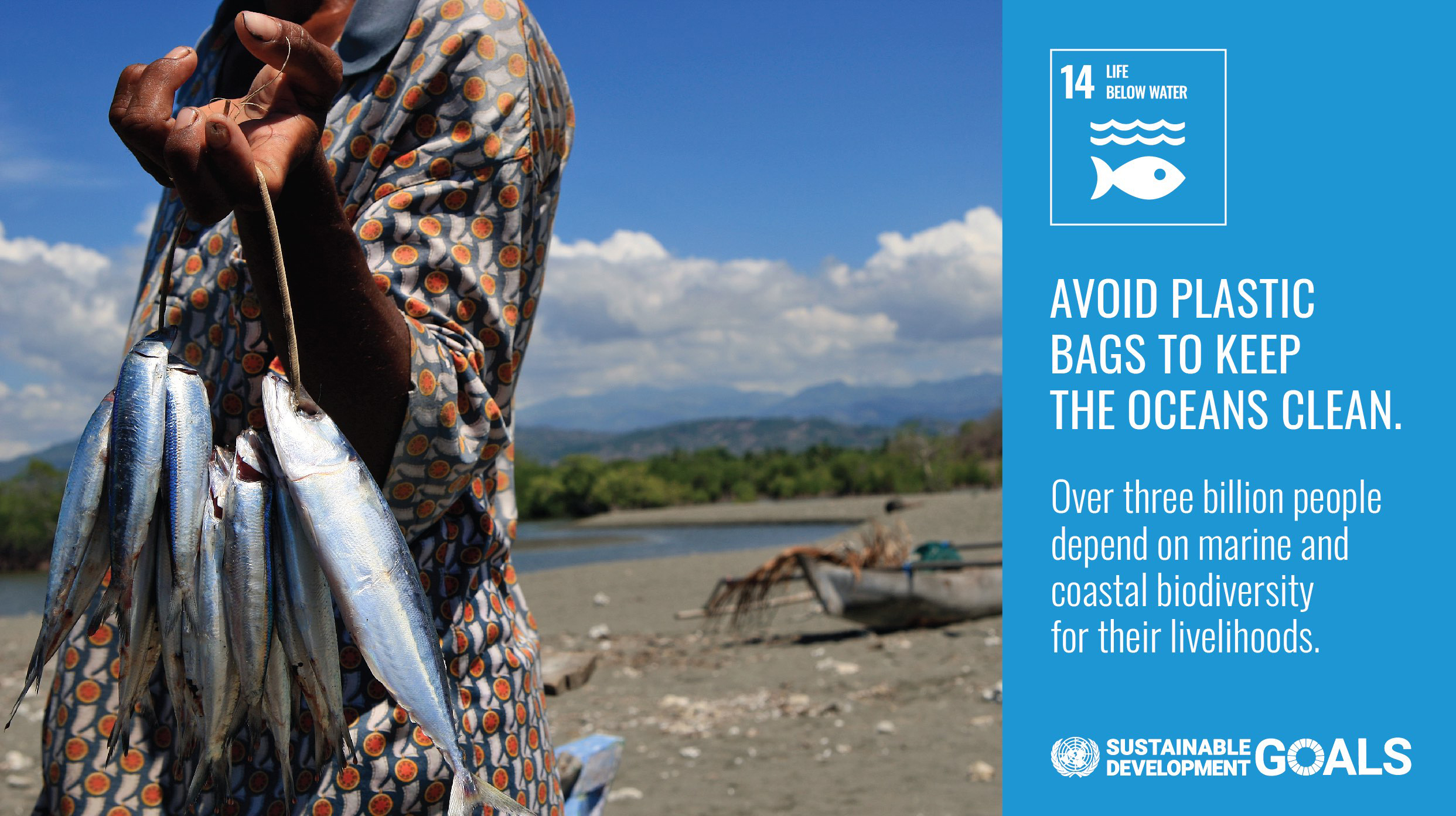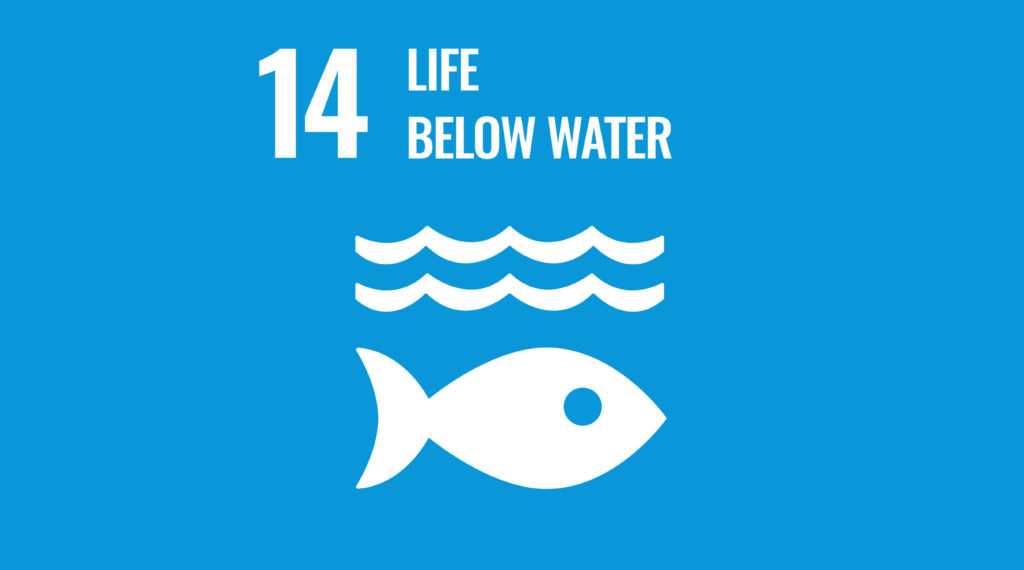Life Below Water
The ocean drives global systems that make the Earth habitable for humankind. Our rainwater, drinking water, weather, climate, coastlines, much of our food, and even the oxygen in the air we breathe, are all ultimately provided and regulated by the sea.
Careful management of this essential global resource is a key feature of a sustainable future. However, at the current time, there is a continuous deterioration of coastal waters owing to pollution, and ocean acidification is having an adversarial effect on the functioning of ecosystems and biodiversity. This is also negatively impacting small scale fisheries.
Saving our ocean must remain a priority. Marine biodiversity is critical to the health of people and our planet. Marine protected areas need to be effectively managed and well-resourced and regulations need to be put in place to reduce overfishing, marine pollution and ocean acidification.
Sustainable Development Goals
The 2030 Agenda for Sustainable Development was adopted by all United Nations Member states in 2015, an agenda that provides a shared blueprint for peace and prosperity for people and the planet, now and into the future.
The 17 Sustainable Development Goals (SDGs) are an urgent call for action by all countries – developed and developing – in a global partnership. They recognize that ending poverty and other deprivations must go hand-in-hand with strategies that improve health and quality education, reduce inequality, and spur economic growth – all while tackling climate change and working to preserve our oceans and forests. Learn more about the UN SDG’s.

What’s the goal here?
To conserve and sustainably use the world’s ocean, seas and marine resources.
Why?
Oceans are our planet’s life support and regulate the global climate system. They are the world’s largest ecosystem, home to nearly a million known species and containing vast untapped potential for scientific discovery. Oceans and fisheries continue to support the global population’s economic, social and environmental needs. Despite the critical importance of conserving oceans, decades of irresponsible exploitation have led to an alarming level of degradation.
Current efforts to protect key marine environments and small-scale fisheries, and to invest in ocean science are not yet meeting the urgent need to safeguard this vast, yet fragile, resource. The drastic reduction in human activity brought about by the COVID-19 crisis, while rooted in tragedy, is a chance for oceans to recuperate. It is also an opportunity to chart a sustainable recovery path that will ensure livelihoods for decades to come in harmony with the natural environment.
Over 3 billion people depend on marine and coastal biodiversity for their livelihood
So what’s the problem?
The ocean absorbs around 23 per cent of annual CO2 emissions generated by human activity and helps mitigate the impacts of climate change. The ocean has also absorbed more than 90% of the excess heat in the climate system. Ocean heat is at record levels, causing wide– spread marine heatwaves, threatening its rich ecosystems and killing coral reefs around the world. Increasing levels of debris in the world’s oceans are also having a major environmental and economic impact.
Every year, an estimated 5 to 12 million metric tonnes of plastic enters the ocean, costing roughly $13 billion per year – including clean-up costs and financial losses in fisheries and other industries. About 89% of plastic litter found on the ocean floor are single-use items like plastic bags. About 80% of all tourism takes place in coastal areas. The ocean-related tourism industry grows an estimated US$ 134 billion per year and in some countries, the industry already supports over a third of the labor force. Unless carefully man– aged, tourism can pose a major threat to the natural resources on which it depends, and to local culture and industry.
How is the ocean connected to our health?
The health of the ocean is intimately tied to our health. According to UNESCO, the ocean can be an ally against COVID-19 – bacteria found in the depths of the ocean are used to carry out rapid testing to detect the presence of COVID-19. And the diversity of species found in the ocean offers great promise for pharmaceuticals. Furthermore, marine fisheries provide 57 million jobs globally and provide the primary source of protein to over 50% of the population in least developed countries.
So what can we do?
For open ocean and deep sea areas, sustainability can be achieved only through increased inter– national cooperation to protect vulnerable habitats. Establishing comprehensive, effective and equitably managed systems of government-protected areas should be pursued to conserve bio– diversity and ensure a sustainable future for the fishing industry. On a local level, we should make ocean-friendly choices when buying products or eating food derived from oceans and consume only what we need.
Selecting certified products is a good place to start. We should eliminate plastic usage as much as possible and organize beach clean-ups. Most importantly, we can spread the message about how important marine life is and why we need to protect it.
To find out more about Goal #14 and other Sustainable Development Goals visit: un.org/sustainabledevelopment

Facts and Figures
- Oceans cover three quarters of the Earth’s surface, contain 97 per cent of the Earth’s water, and represent 99 per cent of the living space on the planet by volume.
Climate change
- Oceans absorb about 30 per cent of carbon dioxide produced by humans, buffering the impacts of global warming.
- Carbon emissions from human activities are causing ocean warming, acidification and oxygen loss.
- The ocean has also absorbed more than 90per cent of the excess heat in the climate system.
- Ocean heat is at record levels, causing widespread marine heatwaves.
Ocean and people
- Over three billion people depend on marine and coastal biodiversity for their livelihoods.
- Globally, the market value of marine and coastal resources and industries is estimated at $3 trillion per year or about 5 per cent of global GDP.
- Marine fisheries directly or indirectly employ over 200 million people.
- Coastal waters are deteriorating due to pollution and eutrophication. Without concerted efforts, coastal eutrophication is expected to increase in 20 percent of large marine ecosystems by 2050.
- Roughly 80per cent of marine and coastal pollution originates on land – including agricultural run-off, pesticides, plastics and untreated sewage.
- Around the world, one million plastic drinking bottles are purchased every minute, while up to 5 trillion single-use plastic bags are used worldwide every year
- Around 680 million people live in low-lying coastal zones – that is expected to increase to a billion by 2050.
- Sustainable and climate-resilient transport, including maritime transport, is key to sustainable development. Around 80 per cent of the volume of international trade in goods is carried by sea, and the percentage is even higher for most developing countries
Goal 14 targets
- 14.1 By 2025, prevent and significantly reduce marine pollution of all kinds, in particular from land-based activities, including marine debris and nutrient pollution
- 14.2 By 2020, sustainably manage and protect marine and coastal ecosystems to avoid significant adverse impacts, including by strengthening their resilience, and take action for their restoration in order to achieve healthy and productive oceans
- 14.3 Minimize and address the impacts of ocean acidification, including through enhanced scientific cooperation at all levels
- 14.4 By 2020, effectively regulate harvesting and end overfishing, illegal, unreported and unregulated fishing and destructive fishing practices and implement science-based management plans, in order to restore fish stocks in the shortest time feasible, at least to levels that can produce maximum sustainable yield as determined by their biological characteristics
- 14.5 By 2020, conserve at least 10 per cent of coastal and marine areas, consistent with national and international law and based on the best available scientific information
- 14.6 By 2020, prohibit certain forms of fisheries subsidies which contribute to overcapacity and overfishing, eliminate subsidies that contribute to illegal, unreported and unregulated fishing and refrain from introducing new such subsidies, recognizing that appropriate and effective special and differential treatment for developing and least developed countries should be an integral part of the World Trade Organization fisheries subsidies negotiation
- 14.7 By 2030, increase the economic benefits to Small Island developing States and least developed countries from the sustainable use of marine resources, including through sustainable management of fisheries, aquaculture and tourism
- 14.A Increase scientific knowledge, develop research capacity and transfer marine technology, taking into account the Intergovernmental Oceanographic Commission Criteria and Guidelines on the Transfer of Marine Technology, in order to improve ocean health and to enhance the contribution of marine biodiversity to the development of developing countries, in particular small island developing States and least developed countries
- 14.B Provide access for small-scale artisanal fishers to marine resources and markets
- 14.C Enhance the conservation and sustainable use of oceans and their resources by implementing international law as reflected in UNCLOS, which provides the legal framework for the conservation and sustainable use of oceans and their resources, as recalled in paragraph 158 of The Future We Want
Links:
Convention on Biological Diversity
UNESCO Intergovernmental Oceanographic Commission
UNDP Water and Ocean governance
UN Division for Ocean Affairs and Law of the Sea

We, at AI for Good foundation, are using AI + ML initiatives in pursuit of the 17 SDGs. With various projects in progress, such as our Climate Trend Scanner and the SDG Data Catalog, we are determined to help and facilitate achieving the goals.







